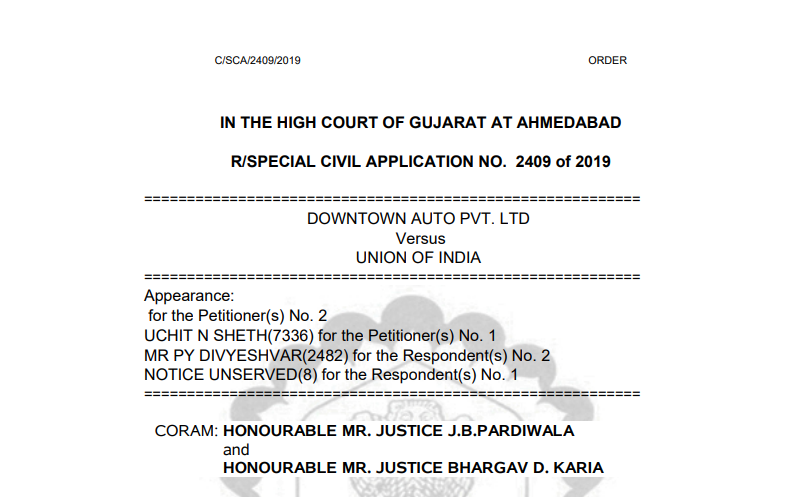Gujarat HC in the case of Downtown Auto Pvt. Ltd
Case Covered:
Downtown Auto Pvt. Ltd
Versus
Union of India
Facts of the case:
By this petition under Article 226 of the Constitution of India, the petitioners have prayed for the following reliefs :
“A. This Hon’ble Court may be pleased to issue a writ of mandamus or a writ in nature of mandamus or any other appropriate writ, order or direction quashing and setting aside impugned notice dated 18.12.2018 (annexed at Annexure A) issued by the learned Respondent No.2;
B. This Hon’ble Court may be pleased to hold and declare that transitional input tax credit is admissible to the Petitioners under Section 140(3) of the GST Act on the basis of a copy of excise invoices of the manufacturer in respect of such goods even though the vehicles were not directly purchased by the Petitioners from the manufacturer and the excise invoices are in the name of the vendors of the Petitioners;
C. Pending notice, admission and final hearing of this petition, this Hon’ble Court may be pleased to restrain the learned Respondents from making coercive recovery qua the transitional input tax credit claimed by the Petitioners in Form GST TRAN 1;
D. Ex parte ad-interim relief in terms of prayer C may kindly be granted;
E. Such further relief(s) as deemed fit in the facts and circumstances of the case may kindly be granted in the interest of justice for which act of kindness your petitioners shall forever pray.”
2. The petitioner No.1 is a Pvt. Ltd. The company incorporated under the provisions of the Companies Act, 1956, and has filed through its director i.e. petitioner No.2. The petitioners are authorized dealers of Honda Cars India Pvt. Ltd. The petitioners also purchased vehicles directly from the manufacturer as well as through other authorized dealers. As the petitioners are not engaged in manufacturing activity, the petitioners were not covered under the provisions of the Central Excise Act, 1944 though the vehicles purchased by the petitioners have borne excise duty paid by the manufacturer.
Observations of the Court:
In the facts of the case, the petitioners are not having CTD, but have produced on record the copies of the invoice received from the dealers along with copies of invoice issued by the manufacturer of the cars or spare parts (as applicable) in name of the dealers showing the payment of excise duty along with the Chassis Number of cars (in case of cars).
Therefore, even though the petitioners are not having CTD the respondent-authorities can very well verify the payment of excise duty on the cars purchased by the petitioners from the dealers and on spare parts on the basis of documents submitted by the petitioners.
In such circumstances, the respondents are required to consider the documents furnished by the petitioners in support of the claim of transitional credit with regard to cars and spare parts lying in the stock of the petitioners as on 30th June 2017 like invoices bearing the name of petitioners issued by the dealer and the invoices issued by the manufacturers in name of the dealer with details such as Chassis Number of the car in case of cars. If the respondents are satisfied on the basis of such documents that the excise duty has been paid by the manufacturer, the excise duty paid should be allowed as transitional credit in the hands of the petitioners.
The judgement of the Court:
For the foregoing reasons, the petition is disposed of with the following directions to meet the ends of justice.
- The respondents are directed to verify the claim made by the petitioners for transitional credit on basis of the said documents submitted by them in respect of the cars and spare parts that whether excise duty is already paid by the manufacturer. If the respondent-authority is satisfied on the basis of the aforesaid verification, the transitional credit claimed by the petitioners under Section 140(3) of the CGST Act is to be allowed, otherwise claim of the petitioners would fail.
- Such exercise shall be carried within a period of three months from the date of receipt of the writ of this order.
In view of the aforesaid directions, the petition is disposed of with no order as to costs.
Read & Download the full Decision in pdf:
If you already have a premium membership, Sign In.
 ConsultEase Administrator
ConsultEase Administrator
Consultant
Faridabad, India
As a Consultease Administrator, I'm responsible for the smooth administration of our portal. Reach out to me in case you need help.













